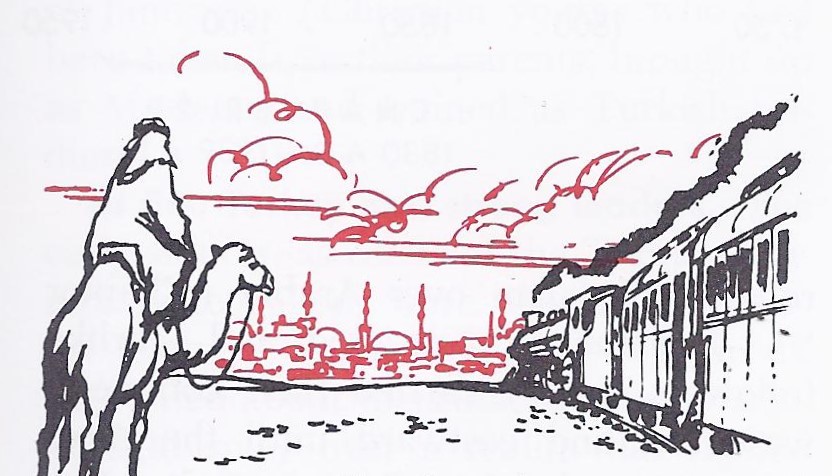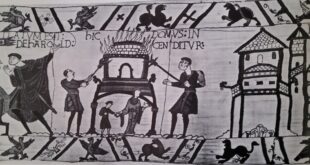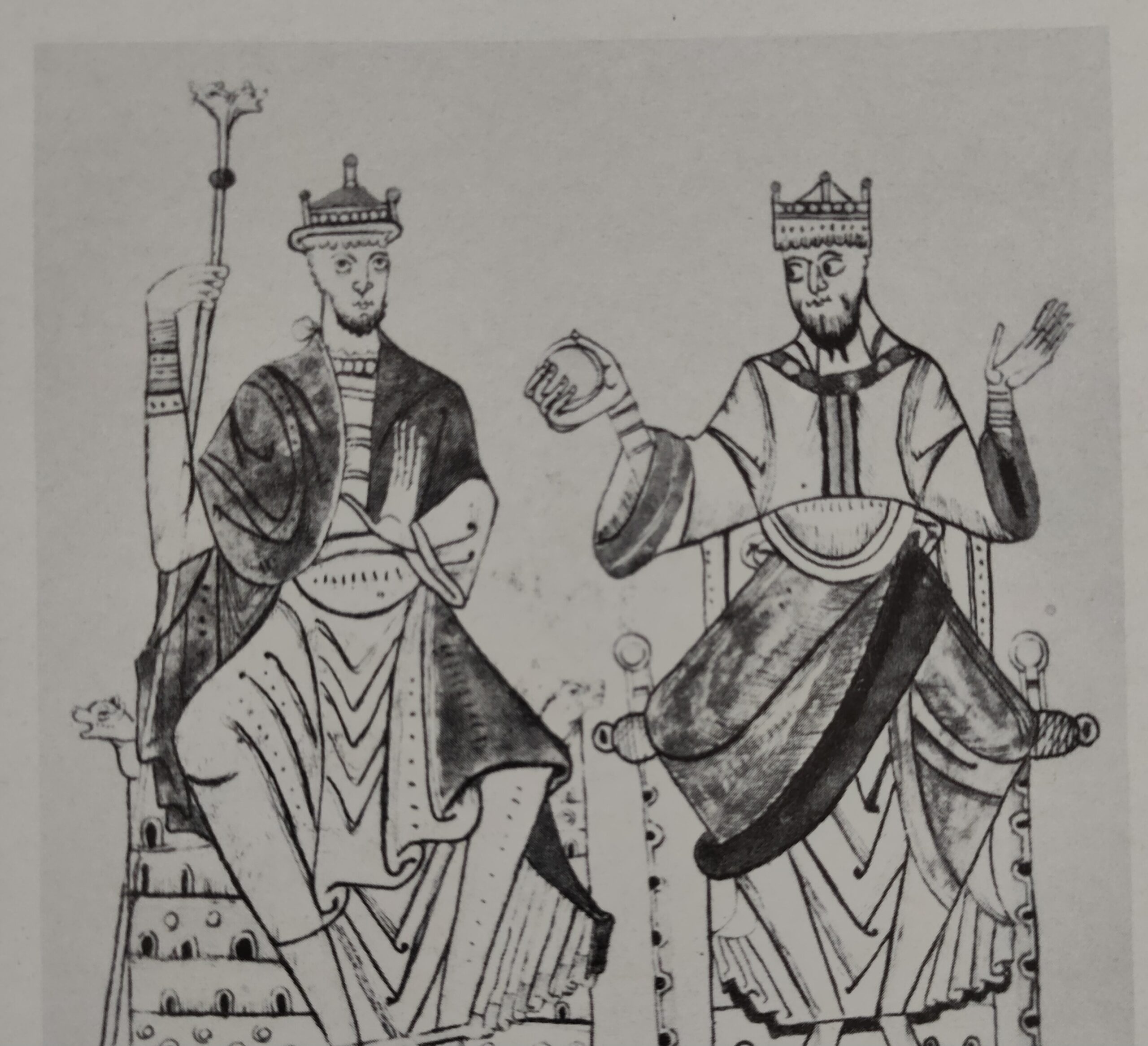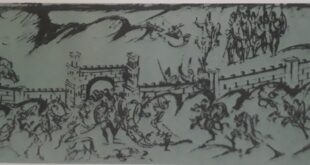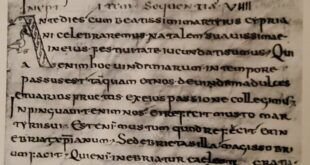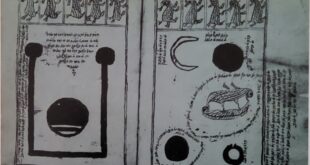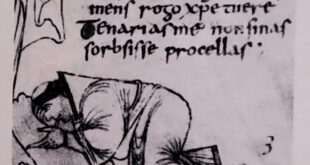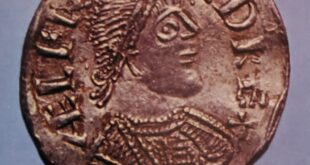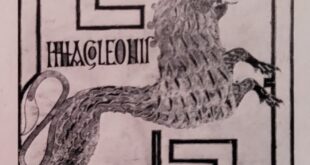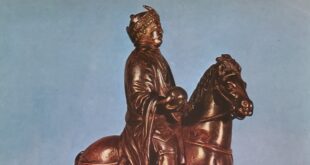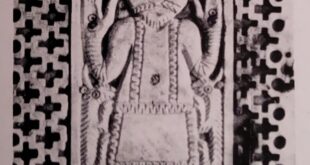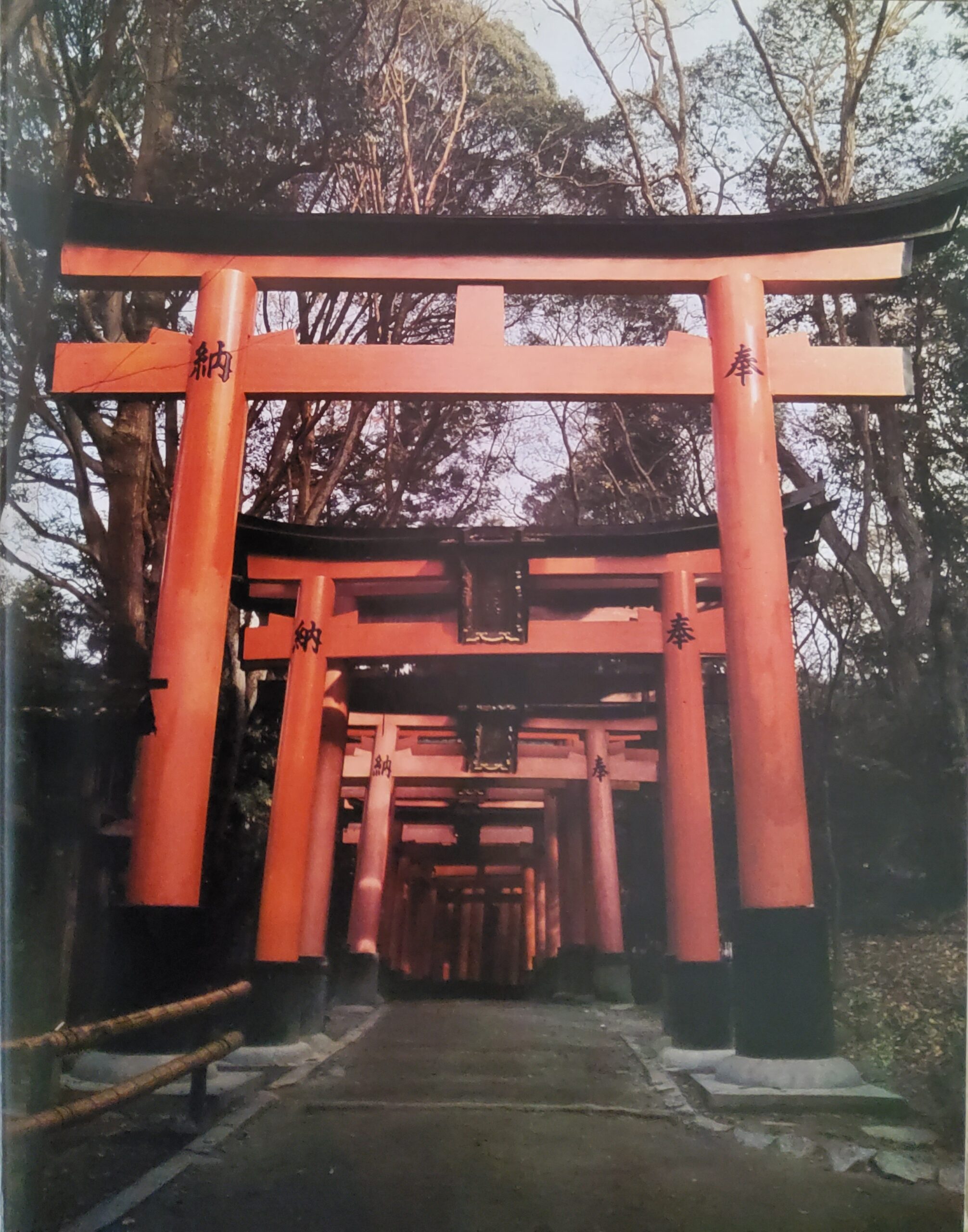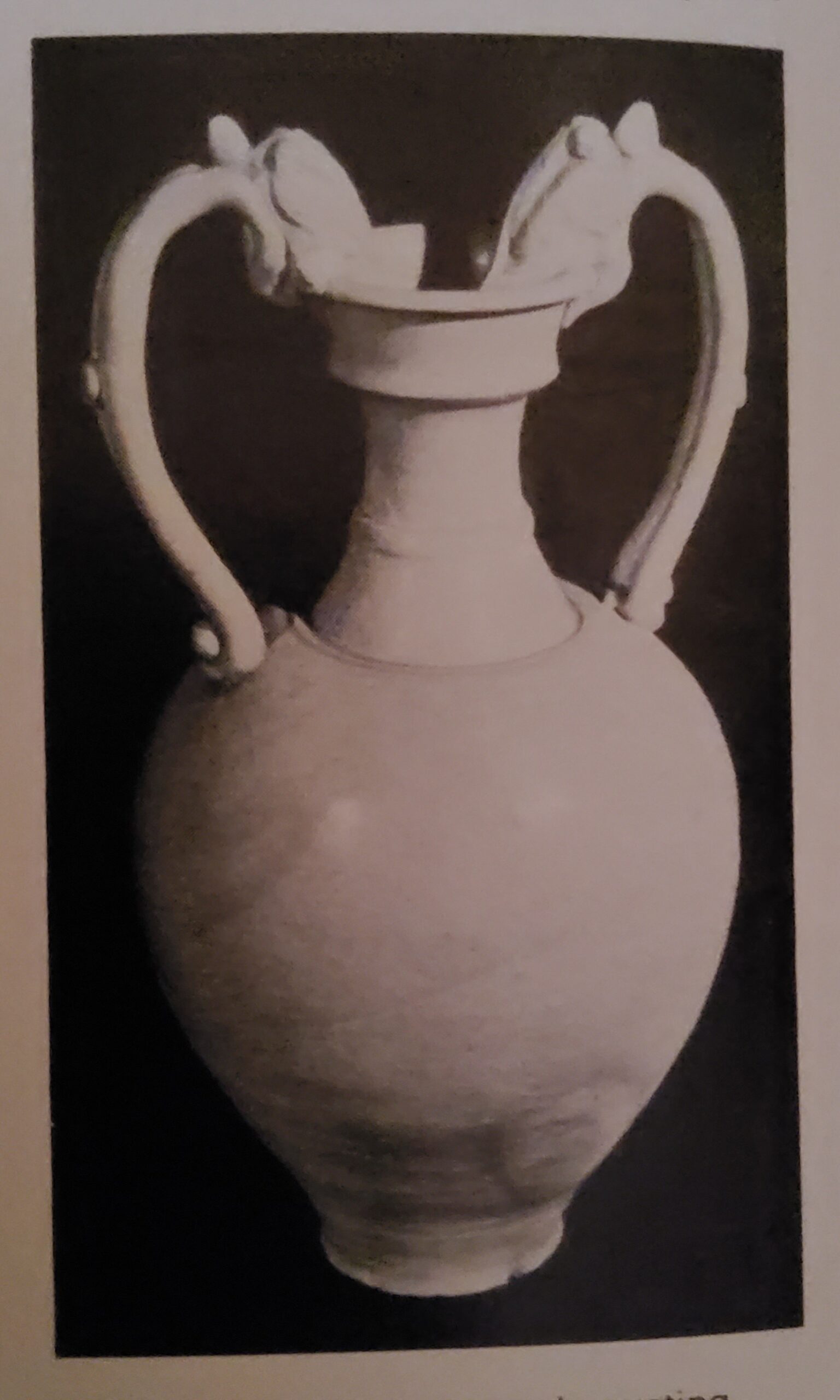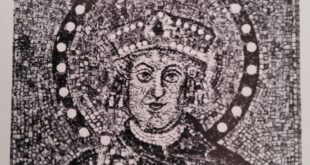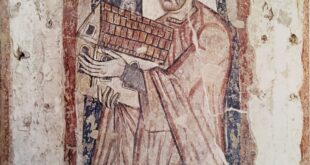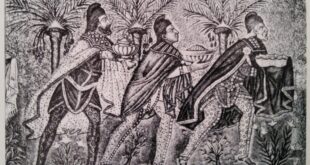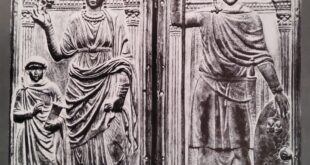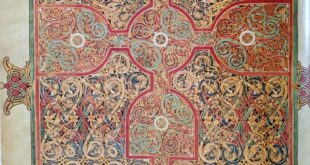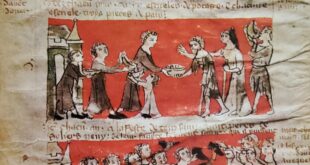Slowly the train had puffed over the heights of the Lebanon Mountains. Now, at last, it was coasting down the eastern slope. Hasan Ali, an Arab trader, gazed ahead down onto the broad Syrian plains far below. Already in the growing light of early morning he could make out some of the tall minarets of the 300 mosques in Damascus. Hasan Ali had first looked on the ancient city many years before when he was a boy. He and his father had joined the great caravan which yearly wound its way from Damascus across the Arabian Desert to Mecca, the holy city of Mohammed, the Prophet of Allah.
Hasan Ali smiled as he thought of the changes that had occurred in his lifetime. This jolting train was one and so was the telegraph line. Both were good for trade. The hospital and the school for girls in Beirut, the city he had just left, seemed to him fine things, although many of his countrymen were less pleased with such changes in their way of life. The same could be said for the modern guns and the clever machines which sewed cloth.

We have read about widely separated parts of the globe — Africa, the Far East, the Pacific and Latin America. All these areas were brought into contact with Western industrialized nations during the late nineteenth and early twentieth centuries. Contacts with the West and Western ways likewise took place, as the opening paragraphs indicate, in the area which extended from southeastern Europe to what is now western Pakistan. Most of the people of this region, along with those of North Africa, shared a common bond — they were followers of the great religious leader, Mohammed.

Today the Moslem world is astir. New states have arisen, the outlook and ways of living of the people are undergoing change. What happened there in the past hundred years and more helps to explain much that is happening there today. Therefore, we shall seek answers to the following questions:
- Why did the power of the Ottoman Turks decline?
- How did European Imperialism affect the Moslem world?
- How did national feeling develop in the Moslem world?
1. Why did the power of the Ottoman Turks Decline?
For centuries the Ottoman Turks dominated the Moslem world. The beginnings of the Moslem world date back to the 600’s, when Mohammed, partly by war and partly by preaching, spread the new religion of Islam over Arabia. Mohammed’s devoted and warlike followers rapidly carried their conquests westward and eastward until the Arab empire extended from Spain to India. However, this vast realm was not held together firmly and in time new conquerors seized control of a large part of it.
Of the various conquerors, the Ottoman Turks held sway the longest. Starting as fierce tribesmen from central Asia, the Ottoman Turks swept the length of the Fertile Crescent, from the Persian Gulf to the Nile. Asia Minor fell to them, as did Arabia. Then in 1453 they captured Constantinople, the one-time capital of the Roman Empire and made it their own capital. Turkish forces even threatened Vienna and it was with great difficulty that they were turned back in 1683. The late 1600’s marked the greatest extent of the Ottoman Empire. At that time it included all North Africa except Morocco, all southeastern Europe and Asia west of Persia. To see how the Ottoman Empire differed from the earlier Arab Empire, compare the maps.
The Turks excelled as warriors. The victorious Turks adopted civilized ways of living from the people they conquered. They took over much from the Arabs, including the Moslem religion and the Arab alphabet. Then, after the Turks captured Constantinople, they copied the arts and sciences of the Christians there but, as their record of conquests show, the Turks excelled in war rather than in peaceful pursuits. One of the earliest occasions when cannon were used for battering city walls was during the Turkish attack on Constantinople. One key to the military strength of the Turks was the crack corps of Janizaries (Christian youths who had been taken from their parents, brought up as Moslems and trained as Turkish soldiers).
At first Turkey had strong leaders. The early sultans, as rulers of the Turkish Empire were called, were able and powerful leaders. Suleimann the Magnificent, who ruled about the same time as Charles V, held sway over a realm that rivaled that of the Holy Roman Emperor. Some, like Murad IV, were ruthless. In 1638 Murad drove the Persian shah (ruler) out of Baghdad in Mesopotamia. Murad’s cannon pounded the walls of Baghdad for 40 days before the city fell. Then the Turks entered the doomed city and dealt cruelly with the defeated forces. An old Turkish report tells this gruesome story: “There were in Baghdad 130,000 picked and chosen soldiers and 20,000 volunteers, all of whom we have put to the sword, not one having escaped to carry the news to . . . Persia.”
Later sultans were weak and inefficient. The later Sultans were poor rulers. Many used their vast powers chiefly to gratify their desires for luxury and pleasure. They made little effort to rebuild the irrigation dams and canals in Mesopotamia and Asia Minor that earlier Tatar invaders had destroyed. Areas once green with crops, therefore, became useless for farming. Moreover, the Turks, being warriors, were inclined to leave trade and commerce to the Greeks, Jews and Armenians in their midst. Instead of strong government control there was graft, inefficiency, and injustice.
One of the last of the sultans was AbduI-Hamid II, who was ruler at the opening of the 1900’s. Abdul-Hamid was a scheming and ruthless monarch who allowed no reforms, though many of his down-trodden subjects begged for them. He resented attempts at self-government anywhere within his crumbling empire. At length his people would have him no longer and he was forced from the throne in 1909.

The Ottoman Empire lacked unity. The Ottoman Empire suffered not only from misrule by its Sultans but from disunity. This condition resulted from (1) differences of religion, (2) differences in nationality and (3) the near-independence of some of the regional governors.
1. Differences in religion. Although the great majority of the sultan’s subjects were Moslems, there were many Christians and some Jews. This was particularly true in the Balkan Peninsula of southeastern Europe. In general the Turkish sultans permitted Christians to keep their religion, but Moslems and Christians were not treated alike. Christians had to pay special taxes, they could not serve in the army and their word was not equal to that of Moslems in courts of law. Sometimes Christians were persecuted. Armenian Christians, for example, suffered cruel persecutions in the late 1800’s and early 1900’s which outraged Christians all over the world.
2. Differences in nationality. Within the Ottoman Empire were Greeks, Slavs, Armenians, Egyptians, Syrians, Arabs and others. Each of these groups had its own language, customs and traditions. Many of them could trace their beginnings back to ancient times and could point to periods of history when their countries had been independent and powerful. It was only natural that such groups should writhe under Turkish rule and impatiently await the day when they could once more be their own masters. During the nineteenth century national spirit grew strong among these various peoples. The Greeks, revolted in the 1820’s. Other Balkan peoples struggled for independence, while Armenians in Asia Minor fought Turkish authority fiercely. In the early 1900’s secret societies, formed by patriotic Arabs, spread the idea of Arab nationalism.
3. Loose control by regional governors. The later Turkish sultans did not personally supervise their far-flung possessions. Instead they sent local governors, called pashas, to rule the major divisions of the Ottoman Empire. Each pasha had a detachment of Janizaries as well as other soldiers at his command. The pashas and their chief assistants were not always Turks. In fact, among the Turkish government officials there were many slaves, some in posts of great responsibility and power. It was not uncommon for such slaves to marry into high-ranking Turkish families. Arabs had long treated their slaves as members of the family and the Turks inherited this kindly custom.
The pashas, supposed to govern in the sultan’s name, sometimes became semi-independent rulers. With soldiers to back up their orders, they found ways to disregard their inefficient, corrupt masters in Constantinople. In Egypt the khedive ruled about as he pleased. Practically independent, likewise, were some of the pashas in Baghdad. The sultans in Constantinople either could not or would not draw their loose-knit empire more closely together.
Turkish misrule, the independence of local pashas and the growing national feeling among various peoples all helped to weaken the Ottoman Empire. Powerful European nations were only too ready to take advantage of this weakness to increase their own power and territories.
The greatest threat to Turkish power was in the Balkans. During the 1800’s and early 1900’s trouble broke out so frequently in the Balkan Peninsula that this region earned the nickname of the “powder keg of Europe.” Sometimes the source of trouble in the Balkans was one of the many small national groups which resented Turkish rule and were jealous of one another. Oftentimes an explosion was sparked by the ambitions of the greater European powers, particularly Russia. Peter I and Catherine II had forced Turkey to give up territory on the northern shore of the Black Sea. Early in the 1800’s Russia had also gained a rich farming area called Bessarabia as well as a wide expanse of territory between the Black and Caspian Seas. Furthermore, you will recall that Russia aided the Greeks in throwing off Turkish control in 1830.
Russia wished to carve up Turkey. After Greece had become independent, it was thought that sooner or later the Ottoman Empire would fall apart. Would it just break up as other subject Balkan peoples sought freedom from the Turks, or would it be pried apart by jealous neighbours? Russia had a particular interest in what might happen, for it did not want any other power to control the vitally important area around Constantinople. Czar Nicholas I, who had nicknamed Turkey “the sick man of Europe,” urged that arrangements be made for dividing up the sick man’s European property. If this were not done, he declared, the great powers of Europe might come to blows over Turkish possessions in the Balkans.
Russia, however, was the only European power which wanted to carve up the sick man’s property before he died. The others, particularly Britain, were content to let him live a little longer. The reason for this attitude is not hard to find. Just because Turkish rule was weak and backward, most European powers did not fear Turkish power. Actually, they preferred to have the Turks hold on to Constantinople rather than to have the city fall into the hands of a great power. Constantinople not only controlled the way in and out of the Black Sea, but stood on the threshold of the markets of the Middle East.
In short, the Western powers were fearful of any “deal” to carve up Turkish lands. The balance of power in southeastern Europe would be upset and Russia might gain territory that would make it a sea power strong enough to threaten their interests.
Russia’s ambitions led to war. In 1853 Russia found an excuse to go to war with Turkey. Great Britain, France and the little kingdom of Sardinia, therefore, banded together to check Russian expansion. Each of these three powers had its own special reasons for coming to Turkey’s rescue. (l) The British government believed that Russia had designs on India and wanted to fill the Mediterranean with Russian warships to cut off British trade routes with the East. (2) Napoleon III, the French Emperor, proclaimed his desire to protect the interests of the Roman Catholic Church inside the Turkish Empire. Actually, Napoleon felt that a resounding military victory would strengthen his position with the glory-loving French people. (3) Sardinia had little or no interest in helping Turkey but went to war to win the friendship of France and Britain.
Russia lost the Crimean War. The Crimean War, which lasted until 1856, got its name from the fact that it was fought largely in the Crimea, a peninsula on the northern or Russian shore of the Black Sea. Most people remember the Crimean War for two things: Tennyson’s poem “The Charge of the Light Brigade,” and Florence Nightingale’s care of the wounded and improvement of soldiers’ hospitals. The chief event was the eleven-month siege of the Russian naval base at Sevastopol. The war cost many lives and both sides committed many blunders. That is the reason why one British statesman later said that in turning down Russia’s proposal to divide up Turkey and in backing the sultan the British had “put their money on the wrong horse.” Nevertheless, by defeating the Russians and halting their advance into Turkey, Great Britain and France had put off for some years the collapse of the Ottoman Empire.
When the Crimean War ended, European statesmen gathered in Paris to draw up peace agreements. Russia had to (1) give up its claims to southern Bessarabia; (2) promise to cease meddling in what is now Romania but what was then Turkish territory; and (3) agree to keep 110 warships on the Black Sea. Turkey had to promise to give better treatment to its Christian subjects. Both Russia and Turkey accepted these terms, though later they disregarded them. Then, after deciding upon certain rules of naval warfare, the European statesmen went home. They believed that they had made a permanent settlement of the conditions that caused the Crimean War and that they had preserved the balance of power. Twenty years later, in 1877, Russia and Turkey once more came to blows in the so-called Russian-Turkish War.

The outcome of the Russian-Turkish War alarmed European powers. The Russian-Turkish War grew out of revolts against Turkish misrule in Bulgaria. The Bulgarians were largely Slavs and Greek Orthodox Christians, like the Russians. When Turkish soldiers crushed the Bulgarian revolt with savage cruelty, the Russians felt they had an excuse for attacking Turkey once again. This time no Christian nation came to the aid of Turkey and Russia easily won the short war.
Several nations, especially Great Britain and Austria-Hungary, were alarmed at the Russian victory, because of its geographic location, Austria-Hungary was Russia’s chief rival in the Balkan Peninsula, while the British still feared that every Russian advance was a threat to India. In London feeling ran high and this song became popular:
We don’t want to fight
But, by Jingo, if we do,
We’ve got the ships, we’ve got the men,
We’ve got the money, too!
This song added a new word, jingoism, to the dictionary. It means a “chip-on-the-shoulder” attitude of one country toward another.
These European powers felt even more alarm when they learned the peace terms Russia had forced on its defeated enemy. Disraeli, the British Prime Minister, was especially distressed by the plan to create a “Big Bulgaria” which would include all the land in the central part of European Turkey and be given complete home rule. Such a Big Bulgaria was bound to fall under Russia’s influence. Turkey would then be so weakened that there would no longer be an effective barrier to Russian expansion into the Middle East. Austria-Hungary, like Great Britain, felt that Russia, acting alone, must not be permitted to decide the fate of the Balkans. So the European statesmen arranged a general peace conference at Berlin in 1878. Chancellor Bismarck presided, not only because he was host in the German capital, but because he was recognized as Europe’s most influential statesman.
The Congress of Berlin rearranged the Balkans. The Congress of Berlin of 1878 was somewhat like the Congress of Vienna of 1814-1815. At neither conference did the statesmen representing their countries have much regard for the wishes of the people. On both occasions they were chiefly interested in balancing the claims of the great powers against one another. The members of the conference proceeded to carve up the Balkan Peninsula to suit themselves. Disraeli justified this program to the British Parliament in the following words:
Our opinion is that the course we have taken will arrest the great evils which are destroying Asia Minor and the equally rich countries beyond. We see in the present state of affairs the Porte, [Turkish government] losing its influence over its subjects; we see a certainty, in our opinion, of increasing anarchy, of the dissolution of all those ties which, though feeble, yet still exist and which have kept society together in those countries. We see the inevitable result of such a state of things, and we cannot blame Russia for availing herself of it. But yielding to Russia what she has obtained, we say to her — “Thus far, and no farther.” Asia is large enough for both of us. . . We have, therefore, entered into an alliance — a defensive alliance — with Turkey, to guard her against any further attack from Russia. We believe the result of this will be order and tranquillity and then it will be for Europe . . . to assist England in availing ourselves of the wealth which has so long been neglected and undeveloped in regions once so fertile and favoured.

The map shows how the Balkan Peninsula was divided by the Treaty of Berlin in 1878. The chief changes were these: (1) Romania, Serbia and Montenegro were recognized as independent and received slight additions to their territory (2) Greece also received a small extension of its northern frontier. (3) Russia regained southern Bessarabia and a small part of Armenia in Asia Minor. (4) The “Big Bulgaria” demanded by Russia was divided into three sections. The part along the Danube was called the Principality of Bulgaria and was to have home rule. The portion south of the Balkan Mountains was named Eastern Rumelia; it, too, was to have home rule. The third party Macedonia, was returned to Turkey with no plans for home rule at all. All three parts, however, would still, at least in name, belong to the sultan of Turkey and were forbidden to unite.
The Congress of Berlin left both Russia and Turkey dissatisfied. Russia naturally felt cheated by this settlement, as did the Bulgarians. Even the sultan of Turkey might well cry, “Save me from my friends, and I can take care of my enemies!” It is true that the British and the Austrians had sayed Macedonia for the sultan. but they paid themselves well for doing so. Austria-Hungary received the right to occupy and rule two provinces, Bosnia and Herzegovina, east of the Adriatic and now part of Yugoslavia. Cyprus, a large island in the eastern Mediterranean, went to Great Britain under a similar arrangement. Although in name the Turkish sultan still held sway over Bosnia, Herzegovina and Cyprus, as well as Bulgaria and Eastern Rumelia, he had lost actual control of these areas. To be sure, Turkey, though a “sick man,” still breathed, but the Congress of Berlin in 1878 and the events leading to it had shown how weak the sick man really was.
TIMETABLE OF THE BREAKUP OF TURKEY’S BALKAN EMPIRE
Greece won independence, 1821-1830
Britain and France helped Turkey defeat Russia in the Crimean War, 1853-1856
Russia defeated Turkey in a later war, 1877-1878
Congress of Berlin recognized Romania, Serbia and Montenegro as independent and made Bulgaria self-governing. Austria occupied Bosnia and Herzegovina, 1878
Eastern Rumelia rebelled and was united with Bulgaria, 1885
Nationalist reformers (the Young Turks) seized power in Turkey, 1908
Bulgaria gained independence and Austria annexed Bosnia and Herzegovina, 1908
In the Balkan Wars, Albania won independence and Turkey lost most of its European territory 1912 – 1913
2. How did European Imperialism Affect the Moslem World?
Except for a few changes, the arrangements for southeastern Europe which had been worked out in 1878 by the Congress of Berlin remained in force for thirty years. During these same years, however, the principal nations of western Europe had started a scramble for empire. Imperialism, took different forms. The British took India right into their empire. Holland did the same with the East Indies. In China, European nations obtained special privileges, or spheres of influence. In Latin America, businessmen from Europe and our own country built up trade and industry; and the United States for a number of years acted as the “policeman” of the Caribbean region.
European imperialism affected the Moslem world in Africa. Once started, it was only natural for the imperialistic minded powers to turn to already weakened Turkey and to other parts of the Moslem world. European powers took over North Africa. France gained control of Algeria, Tunisia and Morocco. Great Britain occupied Egypt to protect its route to India. (The Suez Canal crossed Egyptian territory.) By defeating Turkey in a brief war, Italy obtained Tripoli (Libya) in 1911. These North African states were Moslem world and all but Morocco were loosely tied to the Turkish sultan. The partitioning of North Africa, therefore, was another severe blow to the Ottoman Empire.
Great Britain and Russia clashed in Asia. Russia took no part in carving up Africa, but because of its position astride Europe and Asia, sought land and power in Asia. Russian influence spread into Manchuria, only to be checked by Japan. Meanwhile, Russia had extended its power in central Asia. During the late 1800’s Russian armies subdued the warlike tribesmen of Turkestan and reached the northern border of Afghanistan. Russian agents also tried to gain a foothold in Afghanistan and in Tibet, a lonely mountainous area hitherto shut off from Europeans.
These moves alarmed the British because they seemed to threaten India. British forces, therefore, pushed the boundaries of India northward and invaded Afghanistan. The British also forced the ruler of Tibet to follow their orders in foreign affairs.
It was in Persia, however, that the rivalry between Britain and Russia in Asia came to a head. Persia, or Iran, occupied the upland region between modern Iraq and India. Though an independent kingdom, it was poorly governed and backward in commerce and industry. Both the British and the Russians were anxious to control Persia and to develop its resources. Moreover, by controlling Persia, Russia would have access to the Persian Gulf and thence to the Indian Ocean.
The British and Russians settled their differences in the Middle East. The British naturally did not want the Russians to gain control of Persia, for that would bring Russia too close to India. Neither did British statesmen want a war with Russia. Indeed, by the early 1900’s Great Britain was beginning to look on Germany rather than Russia as its chief rival for world power. In 1907, therefore, Great Britain and Russia reached an agreement which settled their differences in the Middle East. Persia was divided into three spheres of influence. The shah of Persia was to grant concessions and railroad rights in the north of Persia only to Russia. In the southeast he was to give them only to Britain. In the neutral zone running between, the shah could give contracts and rights to either Russian or British businessmen. Neither Russia nor Britain was to seek special privileges in Tibet and Afghanistan was made a buffer state under British influence. This agreement was important not only because it settled British and Russian differences in the Middle East, but because it paved the way for closer relations between the two countries. This friendlier feeling brought Britain, Russia and France together in the Triple Entente.

Germans wanted a Berlin-to-Baghdad railroad. Another goal of European imperialism was Asia Minor. The power most interested in this area was Germany. Germany was a latecomer in entering the race for empire, because Bismarck had been more interested in making Germany secure in Europe than in seeking colonies, but in 1890 Bismarck was dismissed by Kaiser William II, who was jealous of the great German Chancellor. With Bismarck out of the way, the young Kaiser was free to carry out his own policies to make Germany a world power. He immediately launched a program to extend its trade and acquire colonies or spheres of influence.
Asiatic Turkey seemed a likely area in which to extend German influence. The home of various ancient civilizations, this region was now weakly ruled by the Turks and was undeveloped industrially. There were millions of people living here who might buy European goods. During the earlier 1800’s, an English-built steamboat, carried in pieces overland from the Mediterranean to the Tigris River, had begun to carry goods up and down the stream. This river vessel had provided an important link in the water and land route from the Mediterranean to India. German statesmen and businessmen dreamed of constructing a railroad from a point in Asia Minor opposite Constantinople to Baghdad near the Persian Gulf. Such a railroad, when connected with the railroads of central Europe, would give German businessmen a clear path to the resources of the Middle East and at the same time provide a rich market for German goods.
German bankers backed up this plan with large amounts of money. Moreover, the German Kaiser visited the Turkish sultan and succeeded in winning his friendship. One portion of the railroad was completed by 1900 and permission was granted by the Turkish government to extend it to Baghdad, but the Berlin-Baghdad railway was stoutly opposed by the British, who feared it would provide a shorter and cheaper route to India than the water route through the Suez Canal. It would also bring German influence dangerously close to India. France and Russia joined in opposing Germany’s plans and the railway remained uncompleted at the opening of World War I.
Imperialistic ambitions again clashed in the Balkans. It was in the Balkans that the long-smoldering rivalry of European nations reached a white heat early in the 1900’s. Although checked by the Congress of Berlin, Russia had not given up its ambitions to extend its influence in this area. Russia interfered again and again in the affairs of various small Balkan countries. Its excuse was that many of the Balkan people were Slavic in race and like the Russians, Eastern Orthodox Christians in religion. Russia in particular backed the Serbs in their efforts to build up a Greater Serbia.
Austria-Hungary, on the other hand, bitterly opposed Russia’s ambition in the Balkans. Within the Austro-Hungarian Empire were various subject peoples, many of which were Slavic. Any movement to unite the Balkan Slavs under Serbia not only would interfere with Austria’s ambitions for more territory in the Balkans, but might endanger Austria-Hungary itself. In opposing Serbia and Russia, Austria-Hungary had the support of Germany. Germany not only was a member of the Triple Alliance but wanted also to protect Turkey in order to safeguard German plans for the Berlin-Baghdad railroad. These events in the Balkans were closely tied up with the desire of the principal powers (1) to maintain the balance of power in Europe, and (2) to further their imperialistic schemes.

The Young Turks came into power. The meddling of outside powers and the ambitions of various Balkan peoples created confusion and unrest in the Balkans. When Bulgaria and Eastern Rumelia united under one ruler in 1885, no great power lifted a finger to stop this violation of the Treaty of Berlin. Instead of improving conditions among his subjects, the wily but stubborn Sultan Abdul-Hamid spent his time playing off one Christian government in Europe against another. His object was to use their rivalries to increase his own bargaining power, but he met with little success. In fact, he could not prevent an European police force from being sent to keep order in Macedonia.
While Abdul-Hamid schemed and plotted, a group of patriots known as Young Turks grew stronger. The Young Turks wanted to do for Turkey what wide-awake and forward-looking Japanese had done for Japan. They planned to modernize Turkey and make it powerful enough to resist foreign powers. In 1908 the young Turks rose in revolt and obliged Sultan Abdul-Hamid to grant a constitution. A year later, they forced him to give up his power and installed a new sultan who would do as they wished.
Tension increased in southeastern Europe. The Young Turk Revolution was the signal for further disorders in the Balkans. The half-independent Bulgarians seized the chance to declare their country totally independent of Turkish rule. Austria-Hungary annexed outright the two provinces in the Balkans it already occupied, Bosnia and Herzegovina. These losses, of course, were in name only; the Turks had given up any hope that they would ever actually rule these regions again. Austria’s seizure of Bosnia and Herzegovina, however, infuriated both Serbia and Russia. It had been Serbia’s dream that these provinces might become part of a Greater Serbia because most of their inhabitants were Serbs. Russia felt cheated because it had gained nothing while Austria-Hungary had gained much. Hatred between Russia and Austria-Hungary grew deeper.
The Balkan Wars broke out. A few years later even more serious trouble developed in the Balkans. Although the Young Turks were interested in a better Turkey for the Turks, they continued to oppress the Christians. Turkish misrule was particularly bad in Macedonia. Egged on by Russia, the four states of Bulgaria, Montenegro, Serbia, and Greece formed an alliance. They demanded home rule for Macedonia and when this was refused they declared war on Turkey in 1912. ( There had been many wars in the Balkan Peninsula, but the so-called “Balkan Wars” refer to two wars fought there in 1912 and in 1913.)
Even though Turkey was having troubles elsewhere, most Europeans expected Turkey to win. Turkish soldiers had been trained by German officers and were equipped with German artillery, but the Christian Balkan countries easily defeated the Turks. Then these countries fell to squabbling among themselves. The other Balkan countries felt that Bulgaria had gained too much. In 1918 a second Balkan war broke out, this time between Bulgaria and its former allies. Romania also took part in the conflict. Sickening cruelties on both sides marked this second war. Bulgaria was defeated and lost much of the territory previously taken from Turkey.
The Balkan Wars had far-reaching results. The Balkan Wars were important for several reasons: (1) A new state, A1bania, was granted independence. (2) Bulgaria won an outlet to the Aegean Sea, while Serbia and Greece, the biggest winners, divided most of Macedonia between them. (3) Turkey lost all its European territory except Constantinople and a small area around that city.
The Balkan Wars increased distrust and fear among the imperial powers. Anxious to extend its influence in the Balkans, Russia continued to back Serbia in efforts to build a Greater Serbia. Austria-Hungary, backed by Germany, opposed the plans of Serbia and Russia. Fearful of Germany’s growing strength, Britain no longer opposed Russia as in the Crimean War and at the Congress of Berlin. To be sure, imperialistic rivalry existed in other parts of the world, but just as a fire next door seems more dangerous than a fire half a mile away, the scramble for influence in the nearby Balkans seemed to the European powers to be the greatest threat to world peace. It was here that the smoldering hatreds finally brought about World War I.
World War I reduced the Ottoman Empire in Asia. Just as the Balkan Wars had deprived Turkey of most of its European territory, so World War I reduced Turkish possessions in Asia. Due to ties with Germany and fears of Russia, Turkey entered the war on the side of Germany and Austria-Hungary. The Central Powers, as this group was called, were defeated and in the treaties drawn after the war, Turkish control in Asia was confined to Asia Minor. Former Turkish territory along the eastern Mediterranean was organized into the states of Syria (including Lebanon) and Palestine (including Transjordan). Neither Syria nor Palestine, however, was independent. Syria was to be administered by France and Palestine by Great Britain under the general supervision of the League of Nations. Mesopotamia also was organized as the Arab state of Iraq, but protected by Britain under the eye of the League of Nations. Hejaz was recognized as an independent state, but later became part of Saudi Arabia. (Locate these states on the map below.) Thus, by the 1920s, Turkey as an empire had ceased to exist.

3. How Did National Feeling Develop in the Moslem World?
It was the desire of European countries for trade, natural resources, power and land that led to rivalry and sometimes to war in the Balkans, North Africa and in the Middle East. What influenced did Western imperialism have upon the peoples of the Moslem world, especially in the years following World War I.
Missionaries advanced education. Even before Western traders and soldiers came to the Moslem world, missionaries from Western countries appeared. They brought new ideas of education. In the early 1800’s missionaries from England, France and our own country opened new schools which admitted Jewish and Moslem children as well as Christian. In 1834 American missionaries established the school for girls at Beirut in Lebanon. This was the first girls’ school in the entire Turkish Empire. Robert College in Constantinople (now Istanbul) was founded by Americans in 1860. What is now the American College at Beirut followed. Other Christian schools were sponsored by Roman Catholics and still others by members of the Eastern Orthodox Church.
The Moslems, of course, had elementary schools of their own as well as colleges. Moslem children who attended the elementary schools learned much of the Koran and a smattering of reading and writing. At best, however, both Moslem and Christian schools could care for only a small proportion of children. Most others received no formal education.

Medical missionaries brought changes. As in other parts of the world where Western nations spread their influence, medical missionaries introduced new methods of healing into the Moslem world. Medical science, however, had to make its way against strong religious opposition. Most Moslems believed that illness was the work of evil spirits. The right charms, they thought, would drive these evil spirits from the body and so bring about a cure. Moreover, it was hard to obtain nurses for hospitals because Moslems believed it was not proper for women to do such work. In fact, until quite recent times, women in the Moslem countries were regarded as inferior to men and were not allowed to be seen outside the home unless their faces were covered. Gradually, however, hospitals appeared and Moslem women became nurses as well as teachers.
Turkey became the most modern of Moslem world countries. Despite the coming of Western missionaries, businessmen and soldiers, most Moslem peoples continued to follow the ways of living established centuries before. Millions of people remained poor and uneducated. Turkey, however, became a striking exception. Although it had lost most of its empire, Turkey developed into a modern nation during the 1920’s and 1930’s. The man responsible for this remarkable change was Mustafa Kemal.
Mustafa Kemal was a successful military leader who had taken part in the revolution of the Young Turks in 1908. After Turkey’s defeat in World War I, Mustafa Kemal became a leader in the Turkish nationalist movement. The sultan was deposed and a Turkish Republic proclaimed in 1923, with its capital at Angora (now called Ankara) in Asia Minor. Mustafa Kemal became its head.
The government of the Republic was democratic in form. There was a constitution which provided for a president, a cabinet and an elected parliament. All men could vote. Actually, however, Mustafa Kemal was a dictator — though an enlightened one who used his power to modernize Turkey. In the years from 1923 to 1938 he carried through a series of far-reaching reforms. His accomplishments earned him the name of Ataturk meaning “Father of the Turks.”
Public schools were established and school attendance was made compulsory. The system of laws and courts hitherto based on the Koran was modernized. Public works — railroads, highways and irrigation systems — were constructed. Manufacturing was encouraged. The Roman alphabet was adopted and the printing of books in Arabic was forbidden. (Printing had not been introduced into Turkey until three centuries after its introduction into western Europe.) Even methods of dress were affected by Mustafa Kemal’s reforms. Men were forbidden to wear the fez, the traditional Moslem headdress and women were to give up wearing veils.
Ideas of nationalism spread through the Moslem world. Meanwhile the urge for self-rule had caught hold among peoples in other parts of the Moslem world. At first this movement for self-government was directed against Turkey. During the early 1900’s, Arab patriotic societies began to work for freedom. An Armenian National Committee also was formed to help persecuted Armenian Christians. From headquarters in Paris, this Committee carried on efforts to create an Armenian nation. A Syrian-Lebanese National Committee appeared during these same years. Its purpose was to help Syrians gain independence and it sought aid particularly from France and the United States.
World War I aroused new hope in the Moslem world. The war freed many peoples from Turkish control. In addition, such world leaders as our President Woodrow Wilson favoured peace settlements which would recognize the right of national groups to govern themselves. Near the close of World War I, Wilson drew up a list of Fourteen Points to guide the peacemakers. One of these points stated that “nationalities which are now under Turkish rule should be assured an undoubted security of life and an absolutely unmolested opportunity of autonomous [self-directed] development.” To oppressed, misruled and overtaxed peoples within the Moslem world this statement made sense. To them it was a promise that the great nations of the world would see to it that their lost independence would be restored and “a smile went through the desert.” The hopes of independence aroused by this promise, however, were not immediately fulfilled.

Moslem world peoples struggled to throw off foreign control. In the years between World Wars I and II (1918-1939), various peoples in the Moslem world increased their efforts to gain control over their own affairs. Now that the power of the Turks had dwindled, these national movements were directed against the great European powers. National spirit made progress in the following areas:
1. Persia. World War I ended the agreement of 1907 by which Persia was partitioned into spheres of influence for the benefit of Russia and Great Britain. Great Britain, however, continued to exercise great influence in Persia until 1921. In that year a new government was set up and steps were taken to modernize Persia. Beginning in the mid-1980’s Persia became known as Iran.
2. Egypt. Although the British had occupied Egypt for many years, they did not set up a protectorate until 1914. After World War I nationalist feeling ran high among the Egyptians. Violent outbreaks against the British occurred again and again. In 1922, therefore, the British gave up their protectorate, although they still were allowed certain privileges in Egypt in order to protect their interests in the Suez Canal. Egypt was ruled by a king under a constitution. Great Britain and Egypt agreed on a plan for joint rule of the Sudan.
3. Iraq. The people of Mesopotamia resented the control over them which the British had been given by the League of Nations. Uprisings took place. By 1930 the kingdom of Iraq was recognized as an independent state, although the British still had certain rights there.
4. Other areas. National feeling led to the formation of several independent Arab states, of which Saudi Arabia was the largest and most powerful. Syria and Lebanon became independent of France after World War II. Afghanistan succeeded in reducing British influence and winning control of its foreign affairs. The Moslems in western India formed a Moslem League and worked for a separate state rather than a united India. The Riffs, fierce tribesmen in the mountains of Morocco, carried on constant warfare to throw off the rule of Spain and France.

Imperialistic interest in Moslem world regions continued. Although nationalism did progress after World War I, it did not free the Moslem world from imperialistic pressures. There were still many areas that did not enjoy self-rule. Peoples here still depended on the highly industrialized countries for many manufactured products. More important, the Middle East areas had been found to contain fabulous amounts of petroleum.
In our day oil is a tremendously valuable natural resource. It is needed for industry and transportation in peacetime; it is vital in time of war. Most of the industrialized countries required more oil than they produced, so these nations eagerly sought to control the oil fields of the Middle East. Both the businessmen who had invested huge sums in developing these oil fields and their governments realized the importance of safeguarding their oil interests. The safeguarding of these interests seemed to depend on exercising some form of political control. So resentment against outside domination and interference continued to smolder in the Moslem world. and this resentment broke out in full force after World War II.
